Programs Offered
B.Tech (Artificial Intelligence
& Data Science)
Intake – 60
Core Competencies
- Data Sciences
- Machine Learning
- Image Processing
- IOT
- FOSSEE
Vision
To be centre of excellence in the field of artificial intelligence and data science that fabricating globally competent professionals to address industrial and societal needs.
Mission
-
To learn the meaning, purpose, scope, stages, applications, and effects of AI and DS
-
Providing appropriate solutions for the emerging needs of the industry and society.
- Imparting problem solving, leadership skills and entrepreneurial abilities through effective, innovative, and research-based teaching and learning processes.
About AI & DS Department
Overview
Artificial Intelligence & Data Science (AI & DS) Department is established in 2022 with an intake of 60 students. The Department is presently offering B.Tech course with an present intake is 60. The BOS (Board of Studies) of AI & DS Department is having strong industry and academia representatives from Microsoft, EPAM Solutions and United India Online.
The primary objective of Department of Artificial Intelligence and Data Science is to prepare students with the necessary skills to explore the attractive and rapidly developing field of artificial intelligence and data science. This course encompasses elements from mathematics, engineering, and technology. The intends is to provide a gain in-depth understanding of data science processes, data wrangling, data exploration, data visualization, hypothesis building, and testing more over learn about some of the latest AI trends like robotics, generative AI, power bi, ChatGPT, and much more. Furthermore, enrolling in a course in AI and Data Science not only enhances students’ career prospects but also creates job opportunities across the globe and provide extensive research opportunities to solve the societal and industrial problems.
Prominent Features
- Dept. of AI & DS conducted Student training program by Hexart and doing 6 internships in Hexart which is collaborated with Hexagon.
- Advanced computing laboratories of latest configurations.
- The lab equipped with an enriching hardware and software ecosystem, allowing students to learn skills like Robotics, IOT, Coding, Artificial Intelligence, Machine Learning, and Tinkering.
- Strong Mentor – Mentee System
- Excellent academics and placement activities
- Meritorious students are offered scholarships every year.
- 24×7 availability and accessibility of state of the art data centre with high end rack servers, Routers etc
- Well qualified and experienced faculty members
- Offering additional Virtual Lab Classes, Live Classes, Tutorial and Certificate courses through eminent professors
- Project Based Study
- Industry Oriented Curriculum. Robotics, Machine Learning, Cloud Technologies, Mobile Application Development, Data Analytics and other latest technologies have been included in the curriculum in line with industry expectations.
- Memorandum of Understanding with IIIT Enhance Education Hyderabad, Byndr Learning Management System,IIT Bombay Spoken Tutorials, Robofest and loncudos.
- The department constituted various clubs like technical club, art club, cultural club, photography club, sports club, innovation club to support co-curricular and extra-curricular interests of the students.
- Continuous Community connect through NSS .The students of AI actively participate in different NSS activities like blood donation, tree plantation, awareness programs and relief collection & distribution programs whenever required.
- Research within the Department is grouped into Eight clubs such as: Robotics Club, The NLP and Deep Learning Club, The Data Science Club, Amazon Web Services Club, The Drone Club, Internet of Things Club, AI Gaming Club.
Mou’s
AI&DS Team
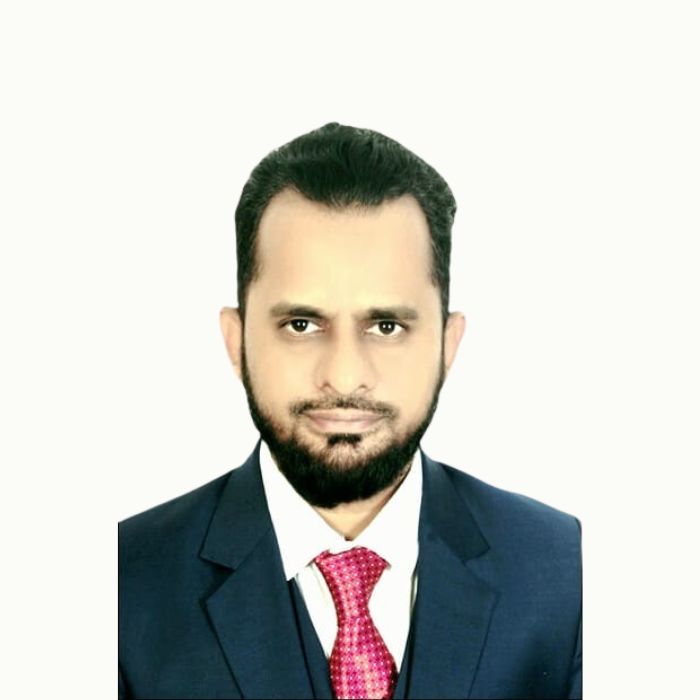
Dr Mohd Nazeer
M.Tech, Ph.D
Head of the Department
Dr Mohd Nazeer obtained his B.E degree in Computer Science Engineering from Osmania University, M.Tech and Ph.D in Computer Science Engineering from JNTUH. He has about 14 years of teaching experience. His current research interests are in Machine Learning, WSN, and Bio Computation. Prior to joining at VJIT he worked as an assistant professor at Muffakhamjah College of Engineering and Technology and Anurag university Currently working as associate professor in VJIT.
He has published more than 10 research papers in various Scopus indexed journals and conferences. He has received the best researcher award from Elsevier SSRN for the year 2022.He has been reviewer for various conferences and journals. He is an active member of various professional body chapters such as ICSES and IAENG.
Faculty Members
| Name | Designation |
| Mr Mohammad Ameer | Assistant Professor |
| Ms Thelidela Nageswaramma | Assistant Professor |
| Mr Chennoji Bhanu Chander | Assistant Professor |
| Dr Mohd Nazeer | Associate Professor |
| Mr P Gurunagarjuna | Assistant Professor |
Outcome Based Education
PEO's
PEO2: Graduates will be able to use their knowledge and abilities to grow in their careers, pursue advanced degrees and develop entrepreneur skills.
PEO3: To be engaged in life-long learning and research activities and promote societal progress.
PO's
Engineering Graduates will be able to:
- Engineering knowledge: Apply the knowledge of mathematics, science, engineering fundamentals, and an engineering specialization for the solution of complex engineering problems.
- Problem analysis: Identify, formulate, research literature, and analyze complex engineering problems reaching substantiated conclusions using first principles of mathematics, natural sciences, and engineering sciences.
- Design/development of solutions: Design solutions for complex engineering problems and design system components or processes that meet the specified needs with appropriate consideration for public health and safety, and cultural, societal, and environmental considerations.
- Conduct investigations of complex problems: Use research-based knowledge and research methods including design of experiments, analysis and interpretation of data, and synthesis of t h e information to provide valid conclusions.
- Modern tool usage: Create, select, and apply appropriate techniques, resources, and modern engineering and IT tools, including prediction and modelling to complex engineering activities, with an understanding of the limitations.
- The engineer and society: Apply reasoning informed by the contextual knowledge to assess societal, health, safety, legal, and cultural issues and the consequent responsibilities relevant to the professional engineering practice.
- Environment and sustainability: Understand the impact of the professional engineering solutions in societal and environmental contexts, and demonstrate the knowledge of, and need for sustainable development.
- Ethics: Apply ethical principles and commit to professional ethics and responsibilities and norms of the engineering practice.
- Individual and team work: Function effectively as an individual, and as a member or leader in diverse teams, and in multidisciplinary settings.
- Communication: Communicate effectively on complex engineering activities with the engineering community and with the society at large, such as, being able to comprehend and write effective reports and design documentation, make effective presentations, and give and receive clear instructions.
- Project management and finance: Demonstrate knowledge and understanding of the engineering and management principles and apply these to one’s own work, as a member and leader in a team, to manage projects and in multidisciplinary environments.
- Life-long learning:Recognize the need for, and have the preparation and ability to engage in independent and life-long learning in the broadest context of technological change.
PSO's
PSO1: Acquire the practical skills in emerging technologies and in-open source platforms related to artificial intelligence and
PSO2: Apply relevant techniques and modern emerging tools in the areas of Healthcare, Education, Agriculture, Smart systems & in all multi-disciplinary problems.
PSO3: An innovative career path to entrepreneurship and life-long learning with moral and ethical values.
Life @AI&DS Department
Facilities
Events / Activities / News
Stay connected and informed with latest engineering news and events, and engage with the college community.
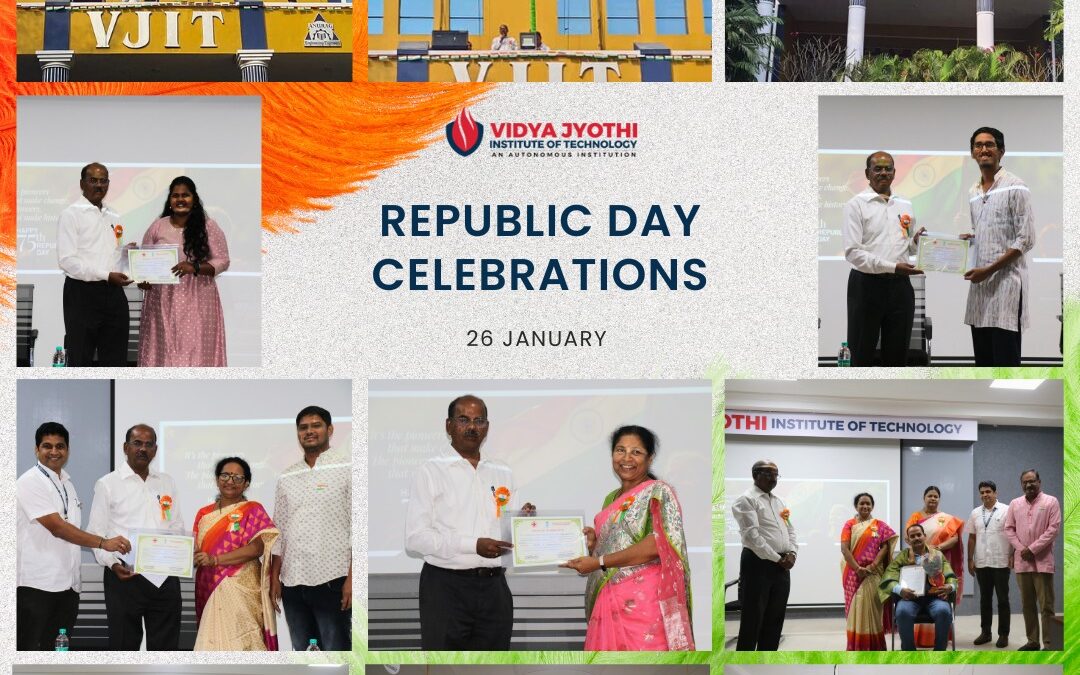
75th Republic Day Celebration
The 75th Republic Day celebration at Vidya Jyothi Institute of Technology (VJIT) was marked by national pride and...
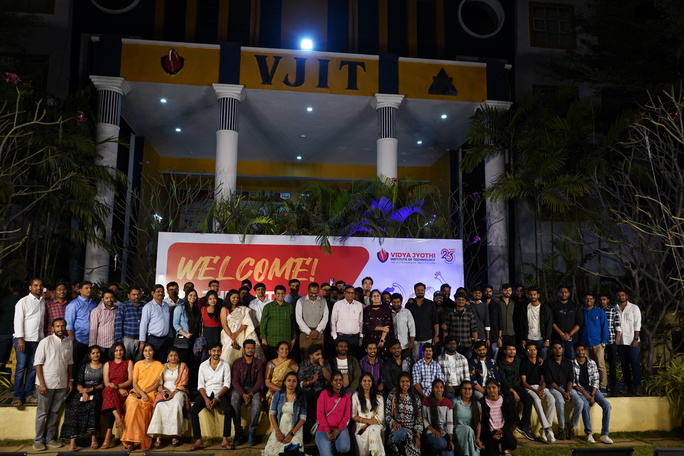
Alumni 2024
The VJIT Alumni Reunion, held on January 6, 2024, emerged as a triumphant gathering that brought together graduates...
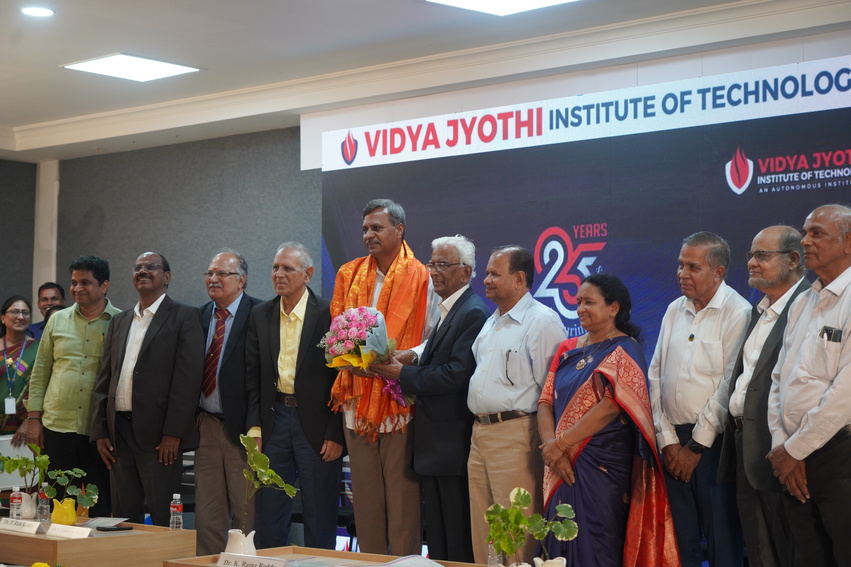
Silver Jubilee celebrations
The Silver Jubilee celebrations at Vidya Jyothi Institute of Technology has been a grand tribute to a quarter-century...
Received Young Engineer Award & Best Thesis Award by ACCE(I)
Celebrating Remarkable Achievements at VJIT! A heartfelt congratulations to our outstanding individuals: Dr....
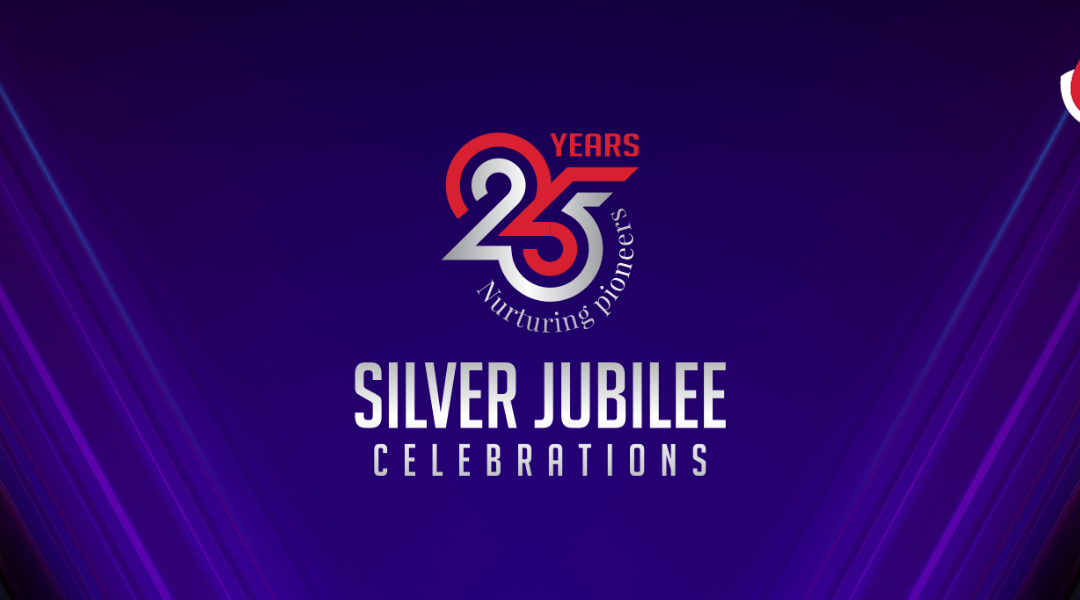
Silver Jubilee Celebrations of VJIT
You are cordially invited to the grand celebrations of the "Silver Jubilee of VJIT" on January 3, 2024, at 11:00 AM....
Algorand Block Chain Club Inauguration at VJIT!
The establishment of the Algorand Blockchain Club on December 22, 2023 at VJIT by the Department of Information...
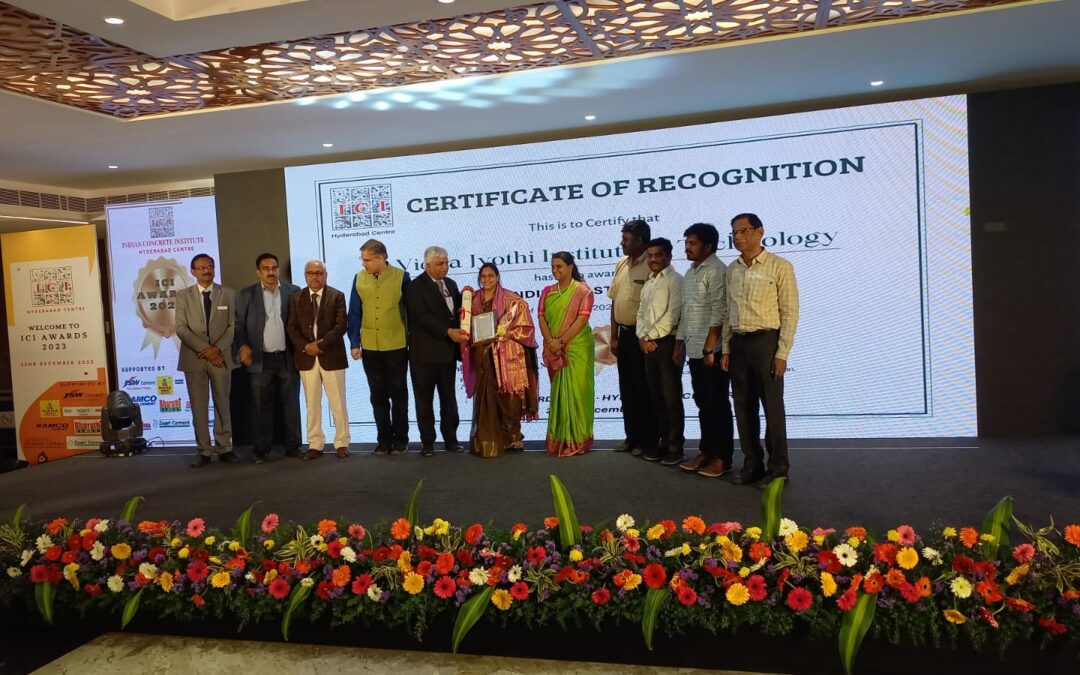
ICI Student Chapter Award at Telangana level from Indian Concrete Institute (ICI) HYDC
Civil Engineering department, VJIT Received Outstanding ICI Student Chapter Award at Telangana level for the year 2023...
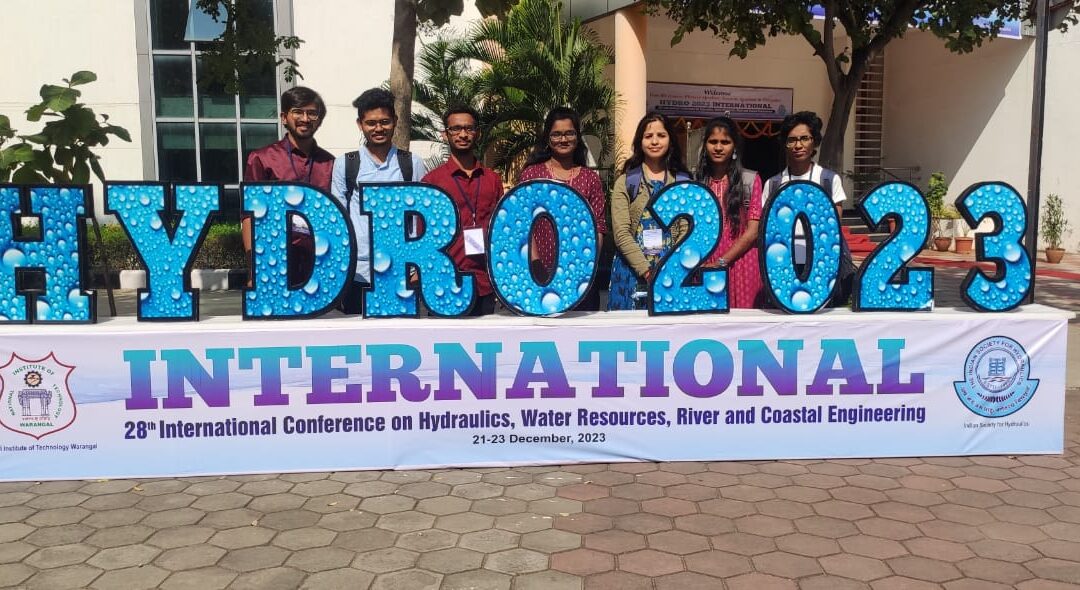
HYDRO 2023 Conference
It is prestigious to be a part of HYDRO 2023 INTERNATIONAL, 28th International Conference on Hydraulics, Water...
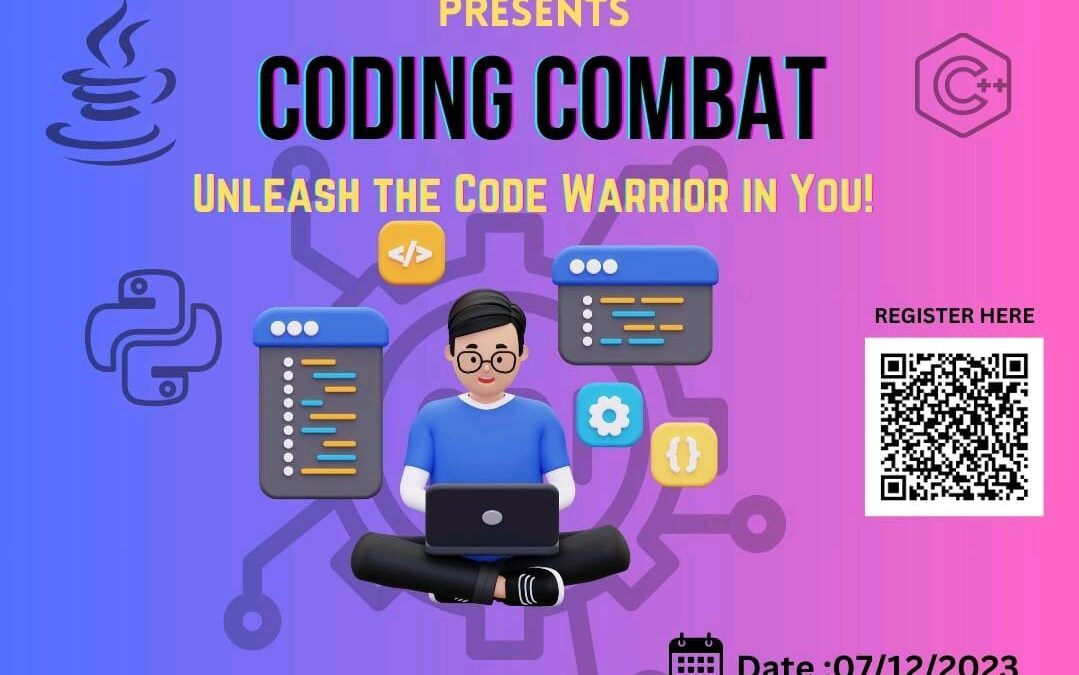
VJIT’s Coding Combat!
Today, we extend heartfelt appreciation to all the brilliant minds who participated in the Coding Combat program...
Offline AICTE-sponsored ATAL Faculty Development Program (FDP) on Recent AI Applications in Medical & Agriculture
Greetings from Department of Artificial Intelligence, Vidya Jyothi Institute of Technology- Hyderabad. We are pleased...
Guest Lecture on Block Chain Technology
VJIT welcomed Kiran Dutta, the Founder of Web3Learn, for an enlightening session on Blockchain technology on November...
Congratulations
Our Civil Engineering Department, VJIT, UG student Mr. Vishal, Volleyball team put up an outstanding performance at...
Achievements
Department Achievements
Faculty Achievements
- A.Obulesh published a book titled “Basics Of Artificial Intelligence : Concepts And Applications”Academic Guru.
- Faculty have applied 2 patents in various Emerging fields of which 1 granted.
- A.Obulesh, speaker for sharing Deep Learning concepts to students in CMR college,Hyderabad.
- A.Obulesh participated in Panel discussion in ICCIDE International Conference -2023.
- A.Obulesh, delivered lecture on Machine Learning Models and Deep Learning at CMR campus.
- A.Obulesh and Ms.Nirosha conducted ML using Python to all other department students in VJIT.
- Department conducted IOT case study based workshop to students by IOT expert Mr.G.Balaram, Anurag University.
- Department conducted workshop on NLP to AI Students by Dr.N.V Ganapathi Raju,HOD –IT,GRIET.
- Conducted various seminars and guest lectures by Industry experts like Prof.Sachin Kamar.
- Faculty have applied 2 patents in various Emerging fields of which 1 granted.
- Around 10 papers published by faculty in various International and National Journals during last two years.
- Certified in NPTEL Courses
- Faculty certified in Pedagogy on Teaching and Learning from IIT Bombay
- CISCO academy on Cyber Security
- MOODLE Learning Management System from IIT Bombay
Foundation program on ICT from IIT Bombay - Established IIT Bombay Remote Center, organized workshops and Certification Programs
View List of Certifications
Student Achievements
- AI Department IV Year Students got placed with 50 Multiple Offers and 35 Single Offers in different companies among 61 students.
- Komuravalli Suchetha IV Year -AI Department grabbed with highest package with 11 LPA in IBM.
- Prabhath Kumar Rayabarapu IV Year -AI Department selected in Techgai with 8 LPA.
- 2 Students from IV Year -AI Department selected in Technovert with 6.5 LPA.
- 7 Students from IV Year -AI Department selected in Eidiko with 6.2 LPA.
- 7 Students from IV Year -AI Department selected in ADP(2), VITVIT(4) and Innova(1) companies with 6 LPA.
- 11 Students from IV Year -AI Department selected in Virtusa with 5 LPA.
- 8 Students from IV Year -AI Department selected in Cognizant with 4 LPA.
- 11 Students from IV Year -AI Department selected in Sutherland(1) , Chegg (3) and Focus Edumatics(3) companies with more than 2 LPA.
- Hemanth Sai, IV year Shortlisted for Amart India Hackathon 2022 finals under Software Edition.
- V. Pawan and Ms.Yashvi K, IV Year got paid internship in ADP .
D. Rohan, IV Year got internship in DRDO. - Satwik Sunnam – IV Year received internship in Sony Research India.
- Mekala Bala Ashritha Reddy & Komuravelli Suchitha , IV Year, got scholarship of 80K from by Bartelsman technology Scholarship by UDACITY.
- Rayabarapu Prabhath Kumar, IV Year received scholarship worth of 30K from Macquarie Group Scholarship (Edx Course).
- Srikari Rallabandi III Year is working as Google Women Engineering Program Trainee.
- Chetelli Vinay Reddy, III Year has achieved certification on “Geo-Spatial Applications For Forest Ecosystem Analysis”, “Satellite Remote Sensing” and “Machine Learning with Deep Learning” concepts on real world satellites and Google map applications conducted by IIRS, ISRO by specialists from ISRO and IITs and is now eligible for further examinations.
- Satwik Sunnam, IV Year selected as a Data Engineer at 31st Research Private Limited with package of 3,60,000 LPA.
- YVD Krishna Meghana, S. Tejaswi, Zaib Unnisa Nayeem, Y. Keerthi Chowdary, A. Sai Harshitha, G. Sravan Reddy, M. Barghav of AI Dept. have won 5th and 6th positions in Data Hackathon organized by Anurag University in association with CSI Hyderabad chapter.
- Raziddin , P.Rohith & Shantana Kumar won consolation prize in VJIT -36 Hackathon
- Praveen Martin, Abdul Omer Farooq, Bachu Tharun Kumar and Jada Kashi Nath II Year, got 2nd place in Ideathon conducted by Google.
- Srikari, III year did Research and dev Internship @InvenioLSI.
K.Madhan, T.Anil, P.Karthik, J. Sri Charan Mohan have contributed to Ton web3 open source network. - Srikari , III year Published 3 Research papers at different peer-reviewed journals and at ICCIDE conference 2023.
- Anil has achieved 2nd place in google devfest Quiz.
- Srikari , III year currently doing Academic Research intern at UC Dublin, Ireland at ASEADOS Lab on cutting -edge AI topics.
- Charan Mohan, Abdul Omer Farooq, Bachu Tharun Kumar and Allamsetti Praveen Martin secured 4th Position in CBIT Hackathon.
- V Sri Datta Bharadwaj, Mangali Yagnesh IV year won 1st prize in Project Expo VJIT-2023.
- Sattarshetty Tejaswi, Yelamaddi Keerthi Chowdary and Zaib Unnisa Nayeem III year won 2nd prize in Project Expo VJIT-2023.
- phalguni, III year has cracked Microsoft azure certification.
Anil, III year was given scholarship by Bertelsmann from UDACITY. - Anil, III year has cracked 2x MICROSOFT AZURE certifications.
Kashinath , III year had selected as SPPs ( students partnership program) by Cognizance Under IIT ROORKEE for Telangana. - P Sathwik, II year participated in G20 presidency state level competitions on 10th Jan at Rajbhavan and received a cash prize and certificate from Governor of Telangana.
Sports:
- Manikanta, Ch.Vinay Reddy and J. Sunil Kumar of III-Year and II-Year AI Students qualified to Semifinals in Cricket-Inter College State Zone Level, Sakshi Premium League.
- Korukonda Shiva Naina, II-Year got 1st Prize in Shotput in Phonix-2022 conducted by VJIT.
- Yelamaddi Keerthi Chowdary, II-Year got 2nd Prize in Shotput in Phonix-2022 conducted by VJIT.
- View List of Certifications Link
Professional Bodies & Clubs
Professional Bodies
- CSI
- ISTE
- ACM Chapter
- Google Development Society
- IEEE-CS Chapter
- IUCEE IASF-chapter
Clubs
- Coding Club
- Machine Learning Club
- Data Science Club
- Gaming Club
- IoT Club
- Robotics Club
- Drone Club
- Deep Learning Club
Industry & Academic Collaborations
Other Information
The AI & DS Dept itself and the H&S Dept organizes different activities for the enhancement of the knowledge of the students and to improve their Life Skills, Soft Skills and Technical Skills. The different activities are –
- Guest Lectures
- Coding contest
- Science Project Exhibition
- Software Project Exhibition
- Poster Exhibition
- Special Classes on Coding at evening hrs for doubt clearance
- Online classes during off days and All India Lockdown Days
- Online test on different subjects
- Quiz
- Seminar by the students
- Value added courses
- Certifications
Value Added Courses
- AWS Cloud Literacy Course
- MOOC on “C and Data Structures”
- CISCO Networking Course
- Machine Learning MOOC at Coursera.org
- CS50X MOOC by Harvard University at edx.org
- Python MOOC at Udemy.com
- Ethical Hacking MOOC at Udemy.com
- “C Programming” at Udemy.com
- Cognizia A
- Microsoft Azure
Resources
Teaching & Learning
Innovative Teaching Techniques
Teaching is an art and science. Teaching is a process of imparting knowledge and skills. It is a systematic process based on some educational objectives to communicate.
The following innovative teaching methods are being adopted:
Interactive Learning
Interactive learning can take many different forms. Students strengthen their critical thinking and problem-solving skills using a much more holistic approach to learning. Interactive learning can take place across the curriculum with technology.
Collaborative Learning
“Collaborative learning is an umbrella term for a variety of educational approaches involving joint intellectual effort by students, or students and teachers together. Usually students are working in groups of two or more, mutually searching for understanding, solutions or meanings, or creating a product.
Collaborative learning activities vary widely, but most center on students’ exploration or application of the course material, not simply the teacher’s presentation or explication of it”.
Why use cooperative learning? To..
- promote student learning and academic achievement
- enhance student satisfaction with their learning experience
- help students develop skills in oral communication
- develop students skills
- promote student self-esteem
5 Elements of cooperative learning
- Positive interdependence
- Face-to-face interaction
- Individual and group accountability
- Interpersonal and small group skills
- Group processing
Flipped Classroom
A flipped classroom is an instructional strategy and a type of blended learning that reverses the traditional learning environment by delivering instructional content, often online, outside of the classroom. It moves activities, including those that may have traditionally been considered homework, into the classroom. In a flipped classroom, students watch online lectures, collaborate in online discussions, or carry out research at home and engage in concepts in the classroom with the guidance of a mentor.
The flipped classroom intentionally shifts instruction to a learner-centered model in which class time explores topics in greater depth and creates meaningful learning opportunities, while educational technologies such as online videos are used to ‘deliver content’ outside of the classroom. In a flipped classroom, ‘content delivery’ may take a variety of forms.
Role Play
Role-playing is the changing of one’s behavior to assume a role, either unconsciously to fill a social role, or consciously to act out an adopted role.
- To refer to the playing of roles generally such as in a theatre, or educational setting;
- To refer to taking a role of an existing character or person and acting it out with a partner taking someone else’s role, often involving different genres of practice.
Think-Pair-Share
Think-Pair-Share (TPS) is a collaborative learning strategy in which students work together to solve a problem or answer a question about an assigned reading. This technique requires students to (1) think individually about a topic or answer to a question; and (2) share ideas with classmates. Discussing an answer with a partner serves to maximize participation, focus attention and engage students in comprehending the reading material.
Benefits:
- The Think-Pair-Share strategy is a versatile and simple technique for improving students’ reading comprehension.
- It gives students time to think about an answer and activates prior knowledge.
- TPS enhances students’ oral communication skills as they discuss their ideas with one another.
- This strategy helps students become active participants in learning and can include writing as a way of organizing thoughts generated from discussions.
Case Based Learning
This method is learner-centered with intense interaction between participants as they build their knowledge and work together as a group to examine the case
The instructor’s role is to facilitate the students collaboratively analyze and address problems and resolve questions
Interactive Learning
Interactive Learning is a hands-on, real-world approach to education ‘Inetractive learning actively engages the students in wrestling with the material
It reinvigorates the classroom for both students and faculty. Lectures are changed into discussion and students and teachers become partners in the journey of knowledge acquisition
Students strengthen their critical thinking and problem-solving skills using a much more holistic approach to learning
Open Educational Resources
Open educational resources (OER) are freely accessible, openly licensed documents and media that are useful for teaching, learning, and research resources that reside in the public domain or have been released under an intellectual property license that permits their free use and re-purposing by others.
Open educational resources include full courses, course materials, modules, textbooks, streaming videos, tests, software, and any other tools, materials, or techniques used to support access to knowledge.
Like Blog, MOOC(Massive Open Online Course), Moodle etc.
Teaching & Learning methodologies
| Faculty Name | Subject | Topic | Innovative methods adopted | Preparation |
| Dr.A.Obulesh | MFCS | Logic | Prolog is sued to show Logic execution | The online tool to execute Prolog is shown and demo is given. Student are given problem to solve. Interactive Online Tool is used : https://swish.swi-prolog.org/ |
| Dr.A.Obulesh | MFCS | WFF : Well Formed Formula | Student’s Seminar | Students have been given real life problems to derive WWF |
| Dr.A.Obulesh | AI | AI Algorithms | AWS Classroom | Students should be good in basic AI algorithms. |
| Kandula Neha | CDS | Programming (Arrays, Stacks, Queues) | Hacker Rank | Students should be good at basic Algorithms and Syntax of concepts |
| Kandula Neha | CDS | Algorithms and logics | Innovative Mini Projects | Students should explain with real life examples |
| K.Kalyani | CL | Cyber Crimes | Students Seminar | Students should explain with real life example cases |
| K.Kalyani | CL | IT Act 2000 | Innovative quiz | Well preparation about IT act 2000 |
| Dr.A.Obulesh | Robotics | Robotics lab | Case Studies | Students should explain with real life examples |
| Ch.Swetha | Concepts of DataStructures through C++ | Trees and Graphs Algorithms | Mini Projects | Students should explain with real life examples |
| D.Vaman Ravi Prasad | MFCS | Pigeon Hole Principle | Poster Presentation | Students should explain Poster with the given topic |
Curriculum
Syllabus
Course Structure
The course structure refers to the choice of topics and the organization and sequencing of course content.
Question Bank
Question bank is a planned library of test items designed to fulfil certain predetermined purposes.
Research & Development
Overview
The Dept of Artificial Intelligence & Data Science is presently working in the following fields of research.
- Data Analytics
- Data Engineering
- Data Science
- Machine Learning
- Artificial Intelligence
- Coding in AI, M, DS and DL – Python, R, Octave etc.
Publications
Placements
Placements Information
Roll of Honors
Toppers – Batch Wise
Toppers – Semester Wise
Contact Us
Dr Mohd Nazeer
Associate Professor, HOD
[email protected]
